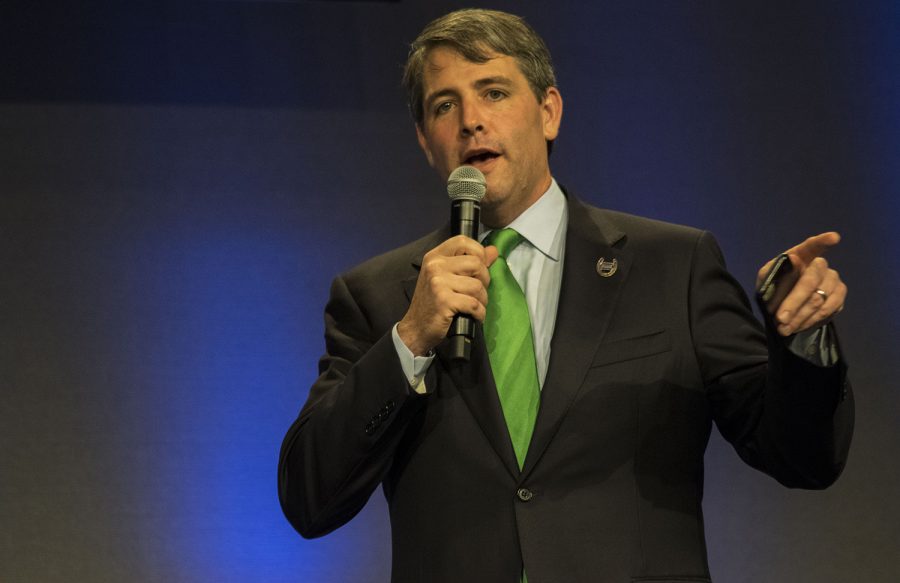Ex-USDA official Tim Gannon eyes Iowa ag-secretary office
Democratic candidate for Iowa secretary of agriculture Tim Gannon hopes to invest more in agricultural research and soil conservation if elected.
Tim Gannon speaks at the Democratic Gala on Saturday, Oct. 6, 2018 in Des Moines. Gannon is the Democratic candidate for Secretary of Agriculture.
October 17, 2018
Iowa secretary of agriculture candidate Tim Gannon wants the state to remain a leader in agriculture.
The 42-year-old Democratic challenger is running against Iowa Secretary of Agriculture Mike Naig, a Republican. If elected, Gannon hopes to invest more into agricultural research and soil conservation.
Gannon grew up in Mingo, Iowa, on his family’s century farm that he now works with his father and cousin. In addition to farming, the University of Iowa graduate also sells crop insurance to farmers and ranchers, helping them manage risk.
RELATED: Iowa Trump rally highlights ethanol expansions
From 2009 to 2017, Gannon worked for the U.S. Department of Agriculture under Tom Vilsack, the former Iowa governor who became U.S. secretary of agriculture in the Obama administration. There, he worked in a variety of positions including associate administrator of the Risk Management Agency, which oversees the federal crop insurance program that helps farmers mitigate the effects of natural disasters.
Gannon and his wife, Liz, live in Des Moines with their daughter Lucy, who was born in December 2017.
One of Gannon’s biggest priorities if elected is to invest more money in agriculture research. He said funding for agricultural research at such institutions as Iowa State has flatlined in the last five years.
The Iowa State Daily reported that in 2001, funding for Iowa State Univeristy’s ag research station peaked at around $37 million. Today, funding is a little under $30 million.
Gannon said he has called on the state to increase state investments in the ag research station to $35 million a year over four years.
“I think it would send a message that the state of Iowa wants to remain cutting-edge,” Gannon said. “We need to continue that investment in ag research so that we are continuing to increase our productivity, because we still have to feed people on a diminishing amount of farmland.”
RELATED: Iowa soybean farmers feeling the heat of tariffs
Gannon also wants to invest in soil conservation.
“We’re an agricultural powerhouse in part because we settled on top of the best soil in the world, but we’ll only maintain the leadership role in agriculture as long as that soil is still there,” he said.
Gannon proposed using a trust fund, which Iowans voted to create in 2010, that would put .375 of 1 cent on sales tax money toward conservation efforts for soil and water. The trust fund was never funded by the Iowa Legislature.
Gannon said that if the Legislature passed a similar sales-tax increase it would create an additional $120 million to go toward conservation efforts. He believes that would also leverage another $120 million investment from the USDA.
“Private landowners and farmers are already investing in conservation, and if they see the state and federal government step up in this way, they would invest even more,” Gannon said.
Along with investing in agricultural research and soil conservation, he also emphasized the importance of making agriculture profitable again.
“… We’ve got to get profitability back into agriculture so that folks who are near the end of their careers know that they can … farm as long as they want,” he said. “But it’s also important for younger generations … to know that they can do it and have it be profitable.”
Having grown up on a farm, Gannon knows the important role agriculture plays in the state, especially because he saw firsthand the effect of the 1980s farm crisis on the state’s economy.
“I’m a huge believer in Iowa’s small towns and our farmers’ contributions to feeding the country and the world,” Gannon said.







